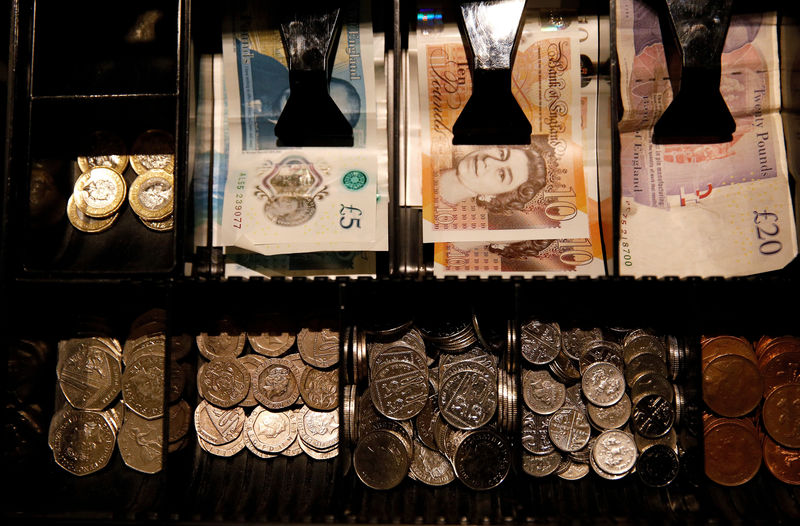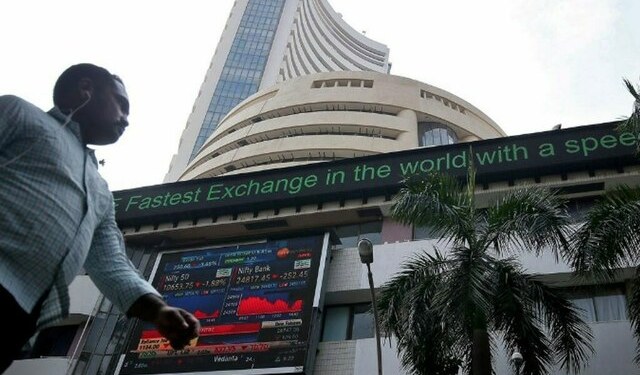 © Reuters. FILE PHOTO: Pound Sterling notes and change are seen inside a cash resgister in a coffee shop in Manchester, England
© Reuters. FILE PHOTO: Pound Sterling notes and change are seen inside a cash resgister in a coffee shop in Manchester, England(Reuters) – British hedge fund manager and Brexit supporter Crispin Odey said on Monday he was again positioning for sterling to weaken, calling the currency “mortally damaged”.
The trade reverses a move, reported by Reuters in early January, that Odey was positioning for the pound to strengthen as he expected Britain to stay in the European Union despite the outcome of the 2016 referendum.
He had told Reuters at the time he expected sterling to rise to “$1.32 or $1.35”. It was trading then around $1.27 but rallied to a four-month high of $1.3218 on Jan. 25, before retreating to around $1.29 now.
Odey said on Monday he had returned to a small short position on sterling, even though he still expected a Brexit delay and his new position was unrelated to Brexit. He did not say when exactly he changed his stance, noting only that sterling had been around $1.29 at the time.
“The market is basically believing we won’t have a hard Brexit and I think they’re probably right….The truth is there will either be a delay or (Prime Minister Theresa May) will get her way,” Odey told Reuters,
He was referring to May’s Brexit divorce bill which was resoundingly rejected by parliament last month. While that has raised the risk of no-deal Brexit, many reckon the government will have to postpone the scheduled March 29 date for leaving the EU.
Odey, who donated more than 870,000 pounds ($1.12 million) to pro-Leave groups and benefited in the past from betting against British assets, said his bigger concern was Bank of England policy.
“The pound is pretty mortally damaged….I can’t be rude enough about (BOE governor Mark) Carney,” Odey said, but did not elaborate. “Brexit is not the issue. It’s QE, QT, globalization – those are the big issues.”
QE or quantitative easing refers to stimulus policies unleashed by the BOE, U.S. Federal Reserve and other major central banks after the global financial crisis. These policies are now being unwound but an economic slowdown could see some stimulus being deployed again, analysts predict.
Carney predicts a worst-case, no-deal Brexit could damage the UK economy more than the 2008 financial crisis but the BOE has said its response to a Brexit shock would not automatically be to cut interest rates.
With six weeks remaining before the UK leaves the EU, Britain’s parliament is deadlocked, with the main sticking point being the so-called Irish backstop under which the UK will heed many EU rules until “alternative arrangements” are made to ensure no hard border between Ireland and Britain post-Brexit.
“I think that the risk to all of this now is that nobody trusts (May) and they certainly don’t believe she wants anything other than the customs union (with the EU) – no one in parliament,” Odey said.
($1 = 0.7736 pounds)
Fusion Media or anyone involved with Fusion Media will not accept any liability for loss or damage as a result of reliance on the information including data, quotes, charts and buy/sell signals contained within this website. Please be fully informed regarding the risks and costs associated with trading the financial markets, it is one of the riskiest investment forms possible.
Source: Investing.com





























